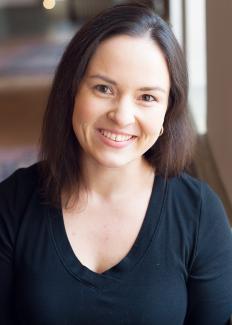
Alexandra Macdonald, Barra Material Culture Fellow at the McNeil Center, is a historian of Britain and early America, specializing in art and material objects from the early modern period to the beginning of the nineteenth century. Her dissertation “The Social Life of Time in the Anglo-Atlantic World, 1660-1830” uses four case studies – brewing, cooking and preserving, dyes and textiles, and pigments and paints – to explore makers’ conceptions of time in the long eighteenth century.
Q: What do you find most rewarding about the research process?
Macdonald: Can it be what I find most rewarding and most frustrating? That it never ends! I have a notebook of sources, ideas, questions, and places to visit that won’t fit into the dissertation but that could hopefully lead to new research projects or to cool teaching resources. With this project in particular, I have been enjoying everyone asking, “but have you tried to make your own indigo or beer or cheese?!” I haven’t yet, but hopefully over the winter break I will have some time to try out an early 19th century recipe for dyeing wool with black walnuts. Having spent years working on tacit craft knowledge I am acutely aware that I lack most of the embodied knowledge to have the dye work perfectly on my first try, but I am excited to see how my attempt to make the dye shapes how I think about my topic.
Q: Who are the three scholars who most influenced your own work?
Macdonald: Pamela Smith’s work with the Making and Knowing Project has shaped how I think about tacit knowledge in craft spaces. I read her first book, The Body of the Artisan, for my qualifying exams and was both utterly hooked and found myself thinking, ‘wait, where are the bodies?’. The combination of inspiration and food for thought has driven my research and I now own what is likely the most dogeared copy of her most recent book, From Lived Experience to the Written Word, in existence (it’s fantastic!). Matthew Champion is another big influence on my work. I started my project interested in a somewhat linear understanding of time and I am now much more interested in trying to understand messy, non-linear, embodied temporality/temporalities. I think the third person has to be Jenn van Horn. Jenn’s creative approach to material culture, and particularly her recent work on iron, has shaped how I think about the stories we can tell using material objects as primary sources.
Q: Who is an author that you think more early Americanists should read?
Macdonald: I would love to see early Americanists reading more art history and material culture scholarship. There are so many great scholars to choose from but Cécile Fromont and Anna Arabindan-Kesson’s work in particular has been helpful to think with recently.
Q: If you could see or visit any historical artifact or site, what would it be and why?
Macdonald: This has nothing to do with what I currently study, but I have always wanted to hike the length of Hadrian’s Wall. When I was little my grandfather used to tell stories about how it was built and why it was built and such and I was fascinated. The full length of the wall no longer survives, but you can still walk the 135km from Cumbria to Newcastle upon Tyne, stopping at Roman forts along the way. Now that I am married to an equally nerdy person who similarly wants to spend hours looking at ruins in what will most likely be a constant drizzle for seven days, maybe this year is the year!
Q: What are you most enjoying about your Fellowship at the McNeil Center?
Macdonald: The people! There is so much diversity in how we all approach early American studies that I am constantly challenged to think not only about what we mean when we say ‘early America’ but about the range of sources and methods we can use to tell more inclusive histories. One of the best parts of being an academic is having the opportunity to bounce ideas around and the breadth of knowledge amongst the fellows means that I walk away from every conversation having learned something new. I feel honored to be part of this year’s cohort and I am excited to keep learning from and alongside this great group of scholars.
Alexandra Macdonald is the Barra Material Culture Fellow at the McNeil Center and a Ph.D. candidate at William & Mary. She received both her BA (Honours with Distinction) and her MA in Art History and Visual Studies from the University of Victoria and holds an MA in History from William & Mary. To learn more about Macdonald’s work, visit her dissertation summary and her professional website.
Read more about Alexandra Macdonald on her Fellow Profile Page.

